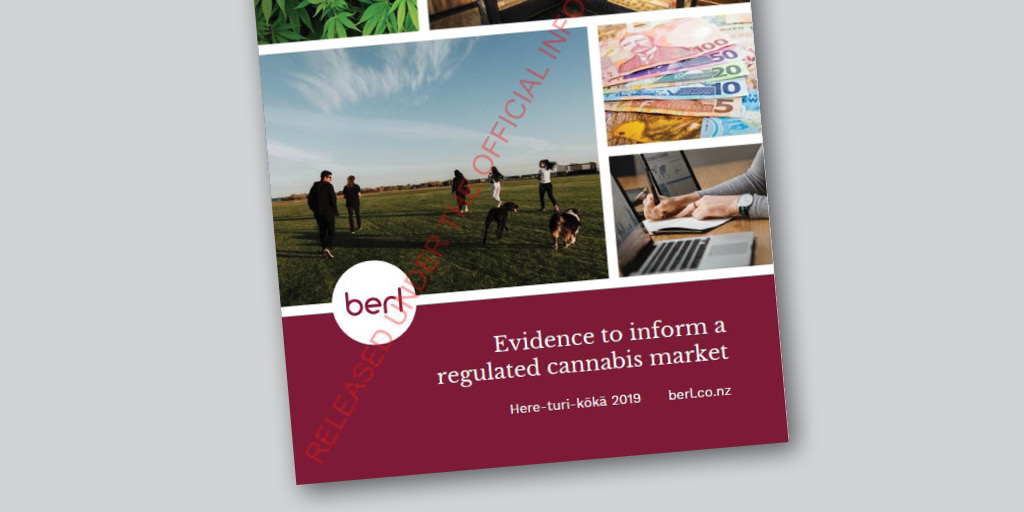Cannabis legalisation could boost public health funding, Government reports show


berl report cover: Evidence to inform a regulated cannabis market [stamped - "released under the Official Information Act} - Berl report: Evidence to inform a regulated cannabis market. (Image supplied)
Two economic reports commissioned by the Ministry of Justice to help with the development of the Cannabis Legalisation and Control Bill were released under the Official Information Act (OIA) last week. The reports, by economic thinktank BERL, analyse what’s happening in the current illegal market, and weigh up the costs and benefits of legalising.
“I’m surprised the Government didn’t want to release these reports proactively,” Kali Mercier, the Drug Foundation Policy and Advocacy Manager says. “They give a clear picture of how a legally regulated cannabis market would benefit New Zealand in so many ways – by putting money towards health and education, reducing convictions and costs to the justice system, and improving health and social justice outcomes. It’s quite clear from this analysis that New Zealanders would be significantly better off with a legal cannabis market.”
A yes vote for legalisation has the potential to create millions of dollars in revenue streams needed for both treatment and harm reduction programs. The BERL reports estimate potential tax wins at over $1 billion yearly, depending on the rate of taxation that is applied.
While that $1b figure is exciting, BERL’s chief economist Hillmarè Schulze emphasises that the most important focus shouldn't be on how much tax legal cannabis generates, but what we do with it. “What we really liked was the Government was looking at the harm reduction, the wellbeing outcomes -that’s what was important for us as well.”
The BERL reports propose a levy on cannabis sales should fund drug education, prevention and health care, and a quick comparison makes clear the Government followed their advice closely in the Bill prepared for us to vote on in October. The draft legislation of the Cannabis Legalisation and Control Bill has adopted many of the suggestions in BERL’s model for regulating the legal cannabis market including quotas and caps on total market share, licensing for the full supply chain, and imposing both an excise duty and levy on cannabis. The market structure has therefore been proposed by economists and subject to rigorous research and analysis - not just pulled out of a hat – so we the public can feel confident it’s economically sound.
Even with this being the case, Schulze says it’s impossible to know exactly what the regulation will look like in practice. “This is a totally new market. The regulation and the structure of the market will involve, if it’s a yes vote, some time to get this right. We don’t know if we’ve designed the perfect market or not.”
Economist Shamubeel Eaqub points out that currently funding for harm reduction and other public health programs is limited and stretched thin because “there is no funding mechanism, there is no revenue stream that goes with it”.
“By bringing it into the legal market we can have a source of excise revenue which can be directed toward harm minimisation,” Eaqub says. “It’s critical that we have a good level of secure funding for services that will improve the public health of New Zealand.”
Eaqub, who is in favour of cannabis legalisation, agrees that while the legislation creates a parameter for a legal market, what will be really interesting is monitoring what happens within a legal market. That includes making sure public health funding is scaled up and applied appropriately. How exactly to do this will become clearer as we gather more information about how the cannabis market works, something which is difficult if not impossible to do when the market is illegal.
“At the moment we know [cannabis is] illegal, but we also know people use it,” Eaqub says. “We know there is harm associated with excessive use of drugs. If you don’t know who is using it, you don’t know how much they're using, you don’t know what the measure of harm is, you don’t know how to reduce that harm. Ultimately I think the idea of bringing [cannabis use] into the light from the shadows is to say ‘this is something that harms just like alcohol or tobacco or driving fast’.
“By making sure it’s out in the light we can start to mitigate those harms. That’s really what these policies are about, right?”
The reports also show positive impacts on employment and other social outcomes, with estimates of about 5000 jobs created in a legal cannabis market, 3000 fewer cannabis convictions each year, 1400 fewer young people leaving school each year without a qualification and as many as 7,800 fewer cannabis consumers with mental health diagnoses.
“The scenarios modelled in the BERL report should give voters confidence that a yes vote in the referendum is the right decision,” Kali Mercier says. “It’s all there in black and white what this could mean for New Zealand. It’s not just about the tax money – though that would obviously be very welcome at the moment. It’s about a fairer outcome for all. An end to pointless convictions, better health interventions, more protections for young people and safer products for people who do choose to use cannabis. This is not about introducing cannabis to NZ – it’s already here. This is about putting some controls around that use. Right now we have no say over who uses cannabis, when, or how. Regulation gives us the tools to change this.”
For more information about the cannabis referendum, check out onourterms.org.nz
Recent news

Reflections from the 2024 UN Commission on Narcotic Drugs
Executive Director Sarah Helm reflects on this year's global drug conference
What can we learn from Australia’s free naloxone scheme?
As harm reduction advocates in Aotearoa push for better naloxone access, we look for lessons across the ditch.

A new approach to reporting on drug data
We've launched a new tool to help you find the latest drug data and changed how we report throughout the year.

